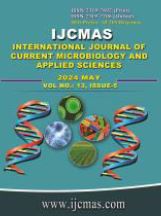


 National Academy of Agricultural Sciences (NAAS)
National Academy of Agricultural Sciences (NAAS)

|
PRINT ISSN : 2319-7692
Online ISSN : 2319-7706 Issues : 12 per year Publisher : Excellent Publishers Email : editorijcmas@gmail.com / submit@ijcmas.com Editor-in-chief: Dr.M.Prakash Index Copernicus ICV 2018: 95.39 NAAS RATING 2020: 5.38 |
Diabetes mellitus is a group of metabolic diseases in which a person has high blood glucose, either because the body does not produce enough insulin, or cells do not respond to the insulin produced. This study was conducted to determine the incidence of intestinal parasitic infections among diabetes mellitus patients which resulted into anaemia as well as the risk factors for acquisition of the parasitic infections. About 221 registered diabetes mellitus patients attending government clinics in Remo Health Zone were recruited for this study. Stool and blood specimens were obtained from each participant to detect intestinal parasites and to determine the blood level of the patients using standard techniques. Overall prevalence of 19.46% of intestinal parasitic infections among the study subjects was observed in this study, patients within the age group 51-60years had the highest prevalence of 39.53%. Toilet type significantly affected infection of intestinal parasites in the subjects (p< 0.05) with patients using pit latrines having the highest prevalence of 48.83%. The sanitary habits and personal hygiene conditions of the patients were risk factors of acquiring the parasite, patients who do not wash their hands had a prevalence rate of 20.8%. Anaemia was significantly associated with patients that had intestinal parasitic (p<0.05). More parasites are observed in type 2 (81.39%) than type 1 (18.6%) diabetes mellitus patients. Ascaris lumbricoides (51%), Entamoeba histolytica (35%), and Hookworm (14%) were the parasites recovered from diabetes mellitus patients. Packed cell volume of the subjects who had intestinal parasites which resulted into an anaemia was 29.65% and was statistically significant p-value <0.00. The prevalence of intestinal parasitic infection among the study subjects was high because the patients are immunocompromised which exposes them more to the infection therefore, routine diagnosis of intestinal parasitic infection of diabetes mellitus patients should be advocated. The risk factors that predispose them to acquiring these infections are; age, toilet type and eating habits, hence proper awareness and good information on personal hygiene and good environmental sanitation should be given to diabetic patient and the public.
Akinbo F, Olujobi S, Omoregie R., Egbe C (2013). Intestinal parasitic infections among diabetes mellitus patients, Biomakers and Genomic Medicine 5:44-47 https://doi.org/10.1016/j.gmbhs.2013.05.003
AlDallal, S. M., & Jena, N. (2018). Prevalence of anemia in type 2 diabetic patients. Journal of Hematology, 7(2), 57 -61. https://doi.org/10.14740/jh411w
Almugadam, B. S., Ibrahim, M. K., Liu, Y., Chen, S. M., Wang, C. H., Shao, C. Y. & Tang, L. (2021). Association of urogenital and intestinal parasitic infections with type 2 diabetes individuals: a comparative study. BMC Infectious Diseases, 21(1), 1-9. https://doi.org/10.1186/s12879-020-05629-9
Aune, D., Feng, T., Schlesinger, S., Janszky, I., Norat, T., & Riboli, E. (2018). Diabetes mellitus, blood glucose and the risk of atrial fibrillation: a systematic review and meta-analysis of cohort studies. Journal of Diabetes and its Complications, 32(5), 501-511. https://doi.org/10.1016/j.jdiacomp.2018.02.004
Caner, A., Zorbozan, O., Tunal?, V., Kantar, M., Aydo?du, S., Aksoylar, S. & Turgay, N. (2020). Intestinal protozoan parasitic infections in immunocompromised child patients with diarrhea. Japanese Journal of Infectious Diseases, 73(3), 187-192. https://doi.org/10.7883/yoken.JJID.2019.054
Delouche, J. C., Matthes, R. K., Dougherty, G. M., & Boyd, A. H. (2021). Storage of seed in sub-tropical and tropical regions.
Hussein A.-M. A., & Neamah, B. A. H. (2021). A study on intestinal parasites among diabetic patients in Najaf governorate of Iraq and its effect on some blood parameters. Iranian Journal of Ichthyology, 8, 127-132.
La Hoz, R. M., Morris, M. I., & AST Infectious Diseases Community of Practice. (2019). Intestinal parasites including cryptosporidium, cyclospora, giardia, and microsporidia, entamoeba histolytica, strongyloides, schistosomiasis, and echinococcus: guidelines from the American Society of Transplantation Infectious Diseases Community of Practice. Clinical Transplantation, 33(9), e13618. https://doi.org/10.1111/ctr.13618
Mahmud, R., Lim, Y. A. L., Amir, A., Mahmud, R., Lim, Y. A. L., & Amir, A. (2017). Protozoa and Helminths. Medical Parasitology: A Textbook, Pp. 3-4. https://doi.org/10.1007/978-3-319-68795-7_2
Maori, L., Salihu, H. S., Kalang, J. J., Haruna, M., Mamtara, R. C., Peters, E.,... & Muhammed, U. (2021). Intestinal parasitic infections among diabetes mellitus patients attending murtala Muhammad specialist hospital (Mmsh), Kano, Kano state. South Asian Journal of Parasitology, 5(2), 6-14.
Nazligul Y, Sabuncu T, Ozblige H (2001): Is there aoredisosition to intestinal parasitosis diabetic patients? Diabetes Care; 24:1503-1504 https://doi.org/10.2337/diacare.24.8.1503-a
Rabhi, H., Guermouche, B., Merzouk, H., & Merzouk, S. A. (2022). The Mediterranean diet biodiversity impact on metabolic and oxidative stress parameters in type 2 diabetes. Genetics & Biodiversity Journal, 6(2), 87-102. https://doi.org/10.46325/gabj.v6i2.269
Rodrigues, C. F., Rodrigues, M. E., & Henriques, M. (2019). Candida sp. infections in patients with diabetes mellitus. Journal of Clinical Medicine, 8(1), 76. https://doi.org/10.3390/jcm8010076
Rodríguez-Pérez, E. G., Arce-Mendoza, A. Y., Montes-Zapata, É. I., Limón, A., Rodríguez, L. É., & Escandón-Vargas, K. (2019). Opportunistic intestinal parasites in immunocompromised patients from a tertiary hospital in Monterrey, Mexico. InfezionMedicini, 27(2), 168-174.
Sharma, A., Tate, M., Mathew, G., Vince, J. E., Ritchie, R. H., & De Haan, J. B. (2018). Oxidative stress and NLRP3-inflammasome activity as significant drivers of diabetic cardiovascular complications: therapeutic implications. Frontiers in Physiology, 9, 114. https://doi.org/10.3389/fphys.2018.00114
Sisu, A., Abugri, J., Ephraim, R. K., Dadzie, I., Essien-Baidoo, S., Kyei-Mensah, J. & Toboh, E. (2021). Intestinal parasite infections in diabetes mellitus patients; A cross-sectional study of the Bolgatanga municipality, Ghana. Scientific African, 11, e00680. https://doi.org/10.1016/j.sciaf.2020.e00680
WHO, 2019
 |
 |
 |
 |
 |